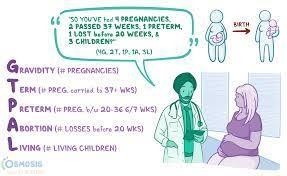A nurse is caring for a client who is at 6 weeks of gestation with her first pregnancy and asks the nurse when she can expect to experience quickening. Which of the following responses should the nurse make?
"This always happens by the end of the first trimester of pregnancy."
"This will occur during the last trimester of pregnancy."
"This usually happens between the fourth and fifth months of pregnancy"
"This will happen once the uterus begins to rise out of the pelvis."
The Correct Answer is C
A. "This always happens by the end of the first trimester of pregnancy.": Quickening typically occurs later in pregnancy, not by the end of the first trimester.
B. "This will occur during the last trimester of pregnancy.": Quickening occurs much earlier than the last trimester.
C. "This usually happens between the fourth and fifth months of pregnancy.": Quickening, which is the first perception of fetal movements by the mother, generally occurs between 16 to 20 weeks of gestation.
D. "This will happen once the uterus begins to rise out of the pelvis.": Quickening does not directly correlate with the rising of the uterus out of the pelvis.
Nursing Test Bank
Naxlex Comprehensive Predictor Exams
Related Questions
Correct Answer is C
Explanation
The correct answer is: c. 42022
Choice A: 40122
Reason: This choice is incorrect because it indicates 4 pregnancies (correct), 0 term births (correct), 1 preterm birth (correct), 2 abortions (correct), but 2 living children (incorrect). The client has 2 living children, which is correct, but the term and preterm counts are not accurate.
Choice B: 20020
Reason: This choice is incorrect because it indicates 2 pregnancies (incorrect), 0 term births (correct), 0 preterm births (incorrect), 2 abortions (correct), and 0 living children (incorrect). The client has had 4 pregnancies, 1 preterm birth, and 2 living children.
Choice C: 42022
Reason: This choice is correct. It indicates 4 pregnancies (current pregnancy, elective abortion, twins, spontaneous abortion), 0 term births, 2 preterm births (twins at 36 weeks), 2 abortions (elective at 9 weeks, spontaneous at 15 weeks), and 2 living children (twins).
Choice D:
The GTPAL system is used to assess a client's obstetric history:
- G (Gravida): The total number of pregnancies, including the current one.
- T (Term births): The number of pregnancies carried to at least 37 weeks.
- P (Preterm births): The number of pregnancies delivered between 20 and 36 weeks, 6 days.
- A (Abortions): The number of pregnancies ending before 20 weeks (spontaneous or elective).
- L (Living children): The number of children currently alive.
For this client:
G (Gravida): 4 (one elective abortion, one twin pregnancy, one spontaneous abortion, and the current pregnancy).
- T (Term births): 0 (the twin pregnancy was delivered at 36 weeks, which is preterm).
- P (Preterm births): 1 (twins delivered at 36 weeks count as one preterm birth).
- A (Abortions): 2 (one elective abortion at 9 weeks, one spontaneous abortion at 15 weeks).
- L (Living children): 2 (the twins).
Thus, the GTPAL for this client is 4-0-1-2-2.

Correct Answer is A
Explanation
A) All of the clients: Maternal serum alphafetoprotein (MSAFP) screening is a routine prenatal test offered to all pregnant women, usually between 15 and 20 weeks of gestation. It is used to screen for certain fetal anomalies, including neural tube defects such as spina bifida and anencephaly. Regardless of a client's medical history or risk factors, the MSAFP screening is typically recommended for all pregnant individuals as part of routine prenatal care.
B) A client who has a history of preterm labor: Preterm labor history is not a specific indication for MSAFP screening. This test is primarily used to screen for fetal anomalies, not preterm labor risk assessment.
C) A client who has mitral valve prolapse: Mitral valve prolapse is also not an indication for MSAFP screening. The test is focused on assessing fetal health and not maternal heart conditions.
D) A client who has been exposed to AIDS: MSAFP screening is not related to maternal exposure to AIDS. It is a test focused on assessing the fetus's risk of certain congenital abnormalities.
Whether you are a student looking to ace your exams or a practicing nurse seeking to enhance your expertise , our nursing education contents will empower you with the confidence and competence to make a difference in the lives of patients and become a respected leader in the healthcare field.
Visit Naxlex, invest in your future and unlock endless possibilities with our unparalleled nursing education contents today
Report Wrong Answer on the Current Question
Do you disagree with the answer? If yes, what is your expected answer? Explain.
Kindly be descriptive with the issue you are facing.
